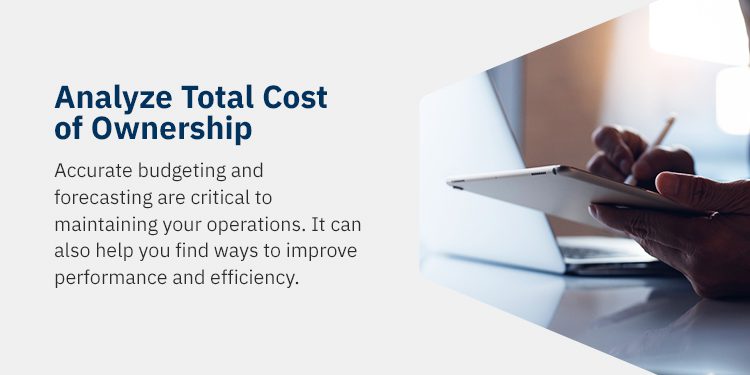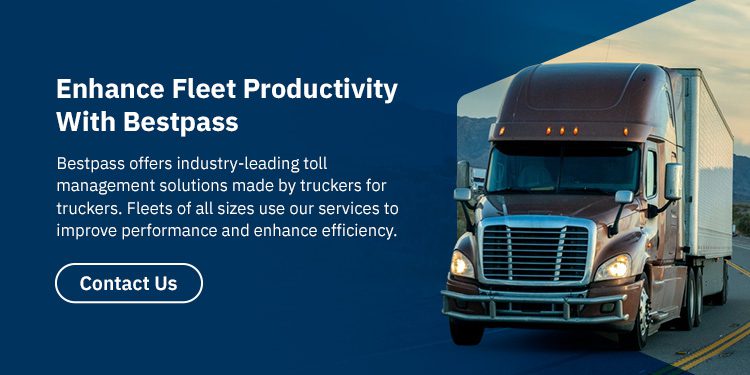
How to Improve Fleet Management
In the trucking industry, time is money, and efficiency is critical. Successful fleet managers and owner-operators know improving fleet performance is vital in a sector facing new challenges almost daily. Fleet managers must understand how to improve fleet management to enhance fleet efficiency without impacting performance. Here are seven ways to do so.
1. Streamline Toll Management
Tolls can be a significant part of any trucking and transport business, as they are often unavoidable when traveling regionally and cross-country. A toll management system can reduce time spent at tolls by streamlining the process. Drivers can avoid bottlenecks and no longer have to keep track of every toll they pass through.
In addition, toll management solutions help fleet managers save time processing invoices, citations and fines from various authorities. Having one platform and provider makes it quicker and easier to pay tolls. Fleet managers can use the extra time to focus on other crucial aspects of the business.
2. Improve Fleet Availability
Enhancing your vehicle availability is one of the best ways to improve fleet performance. Ensuring your vehicles are in optimal condition and ready to drive when needed ensures you can confidently take on new loads. Consider the following elements when securing your fleet’s availability.
- Preventive maintenance schedule: Servicing your fleet vehicles on time can help them perform better. Proactive maintenance ensures your vehicles are in good condition and can prevent unexpected breakdowns, reducing downtime. Keep up with a service schedule to better plan deliveries.
- Parts replacement strategy: Your maintenance schedule should include a replacement strategy. Knowing the mileage when you need new brakes or shocks means you can actively plan when to replace parts. You can align replacements with services, further improving your fleet’s productivity. Replacing parts before they fail can lower the risk of accidents and reduce downtime. It can also help you budget for the cost of buying new components.
- Vehicle replacement system: Developing a vehicle replacement system can ensure your fleet remains productive. Use data based on performance, depreciation and average operating costs to determine when you need new vehicles. You can also plan replacements to minimize the impact on your fleet’s efficiency. New vehicles can enhance fleet productivity by outperforming older trucks in your fleet.
3. Choose Fleet Management Software
You can track many different elements of your business to improve efficiency. However, individually monitoring each aspect can be overwhelming and time-consuming, slowing down operations. Fleet management software offers one platform to monitor and evaluate these variables. Use it to track:
- Vehicle inspections
- Maintenance and service history and reminders
- GPS and telematics
- Expenses
- Reports
Fleet management software can also automate various processes, saving you time. Further, you can store crucial data on one easy-to-access platform rather than in multiple physical locations. Having one secure, easily accessible way to store information can prevent lost documents. Spend less time hunting for records and more time getting work done.
Fleet management technology can also improve communication across departments. Instead of relying on paper trails, emails or phone calls that can easily lead to confusion, you have one channel for all communications. The easier it is for your team to collaborate, the more they can get done in the same amount of time.

4. Analyze Total Cost of Ownership
Accurate budgeting and forecasting are critical to maintaining your operations. It can also help you find ways to improve performance and efficiency. Understanding the total cost of ownership includes all expenses, from monthly maintenance costs to the cost per mile for your deliveries. You can use this valuable information to monitor and control expenses at every level. These details can help you prevent miscalculations and identify ways to reduce costs, making your fleet more efficient.
5. Measure KPIs
Key performance indicators are an excellent way to measure your fleet’s productivity. KPIs can help you track fleet efficiency, costs and productivity. Tracking these areas can help you understand how your fleet is performing, identify opportunities for improvement, develop strategies to improve performance and evaluate your success. KPIs also ensure you have sufficient data to analyze and understand how well your fleet is doing across the board.
Implementing strategies to improve productivity without a way to measure their impact and success can do more harm than good. By design, KPIs let you track and monitor progress.
6. Manage Fuel Expenses
Fuel is one of the most significant portions of any trucking business’ budget. An effective way to do this is by using GPS trackers and monitoring drivers’ performance. Behaviors like excessive idling and speeding can cost more in fuel over time. Tracking drivers can also highlight any off-duty or abnormal usage that could contribute to higher fuel expenses. Improving driver behaviors can help cut down on fuel costs. It also has the added benefit of improving safety, preventing additional costs and downtime from accidents.
7. Optimize Routes
Use software and real-time tracking to analyze and optimize routes. Technology that allows for real-time updates empowers drivers to adapt to changes in traffic patterns and take more efficient paths. Real-time monitoring can also help you notify customers of delays, their causes and up-to-date arrival estimates. This communication can help enhance your business’ reputation.
Enhance Fleet Productivity With Bestpass
A toll management system is a simple yet effective way of improving your fleet’s efficiency. Bestpass offers industry-leading toll management solutions made by truckers for truckers. Fleets of all sizes use our services to improve performance and enhance efficiency. The valuable insights into your toll costs can help you determine which routes have the most expensive tolls and the average toll cost per vehicle, while streamlining vehicle processing. To learn how our team can help you make toll payments quick and efficient, get in touch with us today!
Let Bestpass Have Your Back!
Contact us today and let us work our toll magic and see how we can help your fleet!


